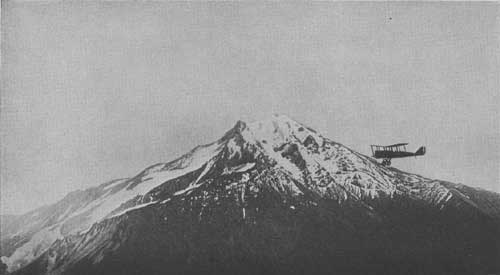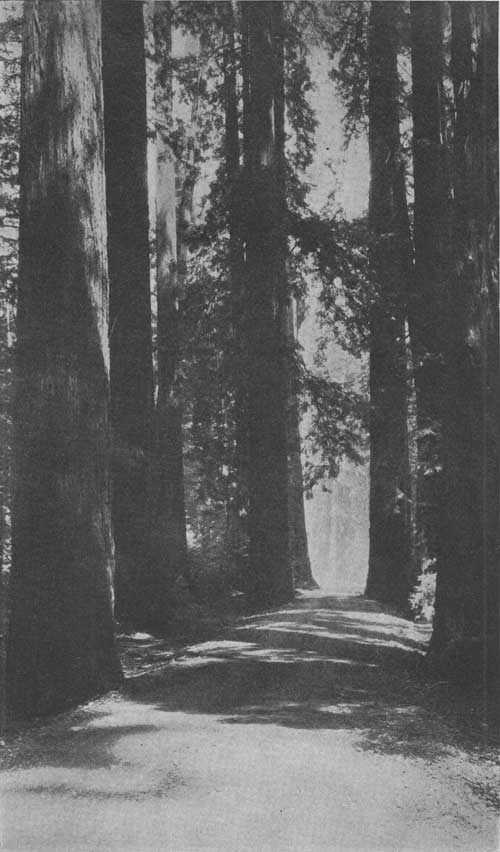|
Taming Our Forests
|

|
THE NEXT HUNDRED YEARS
When the end of this century comes there may possibly be a regular service by balloon up into the stratosphere. If we look over the edge of our gondola, what will we see?
One-third of the map below us will be green with treetops. From the snow line down all the steep mountainsides, the trees will be clinging like moss. The Great Lakes will flash the light back at us like mirrors; and the little lakes will look like spangles against the green velvet of the trees that surround them. The great bowl of the Mississippi Valley will be fringed with forests, and across it will stretch the fluttering band of the shelterbelt, with the space between it and the Rockies covered again with grass as it was a hundred years ago, but pastured now by cattle and sheep instead of by antelope and buffalo. There will be places where instead of the level surface of the tamed forests, a few great trees will lift ragged crowns above an undergrowth of saplings and brush—wild forests left to show what sort of communities trees established for themselves before man became a part of their environment. If we send our gondola down close above one of these primitive areas we may see gray cougars and bobcats and lynx snarling at the hungry timber wolves, and keeping a sharp lookout for any unwary deer or elk or moose which may have strayed in.
But when a gentle breeze carries our gondola over a domesticated forest, we will see men moving about through the even stands of straight, strong trees. They will be cutting those ready to market and hauling them to a permanent mill in the center of a permanent forest city which will not be far away. Out of these forest cities will be coming train loads, not of logs, so heavy and wasteful to transport, but of the things that are made from wood, from rolling pins to newsprint paper—finished products going straight to market.
At night these little towns will glitter up at us because they will be hung with electric lights like perennial Christmas trees, for there will be an electric plant where a dam holds back the water of the nearest little river to give them cheap power. All during the season of melting snows and full streams the forest cover helps to hold the water back, so that this dam is full well into the summer. When the low water does come, the little plant is hooked up with one of the hydroelectric systems generating power from a dam on a river with a perpetual flow.
As our gondola drifts on over the farm homesteads we shall see that they are sparkling also. We shall see the cows herding toward their stanchions in bright light and hear the whir and chug of the electric milking machines, and the thud of the food chopper getting fresh fodder ready for their evening meal. From the fireproof, shrinkageproof plywood house will come the intermittent buzz of the electric refrigerator keeping the farmer's frozen dessert hard till he comes in from the barn and washes up in the water that the electric pump sends in from the well, which never grows dry these days, because the restored forests are helping to keep the water table at an even level.
If we dip down close enough to listen above the shelterbelt, we may hear some old man telling his grandson what his father told him—that there was a time when the grass had been plowed from the high plains and the wind lifted the earth and laid it down upon the green fields so that every living thing died. But this the boy, remembering the rich pastures to the west and looking across the growing crops to the nearest row of trees, and feeling the gentle clean wind, will not believe.
We will drift across schoolhouses of a new type where thousands of young people will be getting part of their education in the forests—not just those who plan to make forestry their profession, but those who are preparing for life in a real civilization for by the end of the century, we shall have learned that no liberal education can be got without a knowledge of that one-third of our land which the forests cover and that it is easier to transport boys and girls than trees.
If we see a sudden boiling up of smoke it will be where the thunderheads have dropped a bolt and almost as soon as the flames show red, there will be the sudden rush of the fire fighters' motors along the hard roads that are stretched like ribbons through the forest. We will see the motors dipping down through the valleys, disappearing behind trees, covering straight stretches at 70 miles an hour, taking the steep grades in their stride, and closing in on that red flicker under the smoke. And while we are watching, a patrol plane will zoom across below us, and if we tune in on the broadcast which is coming from it, we will hear something like this, "Fire crowning north of the ravine"—"plenty of water for the pumps in Jones' pond"—"Wind dying down"—"tied in all around"—"no smoke except on the burn"—"mop up."

|
| The patrol plane. |

|
| Coast redwoods, California. |
In that land on which we look down from the stratosphere, there will be great playgrounds among the trees and streams and gentle animals. That same longing of the Medean queen for the forested hills where she was born, which King Cambyses tried to satisfy by building for her the Hanging Gardens of Babylon, will be satisfied for the millions of us who take our ease in our forests—such pleasure places as the Medean queen never knew.
By the turn of the next century, the 150,000,000 of us who will be here, may have domesticated our forests so that they will yield an ample, perpetual harvest. We may have developed them so as to protect our land as no army of men could protect it. By their help we may conserve that precious water power which can be transmuted into electricity and that in turn into leisure. If we have done this we will have reshaped our world into a far better place to live in than it is now.
| <<< Previous | <<< Contents>>> |
|
taming-our-forests/sec14.htm Last Updated: 19-Apr-2010 |